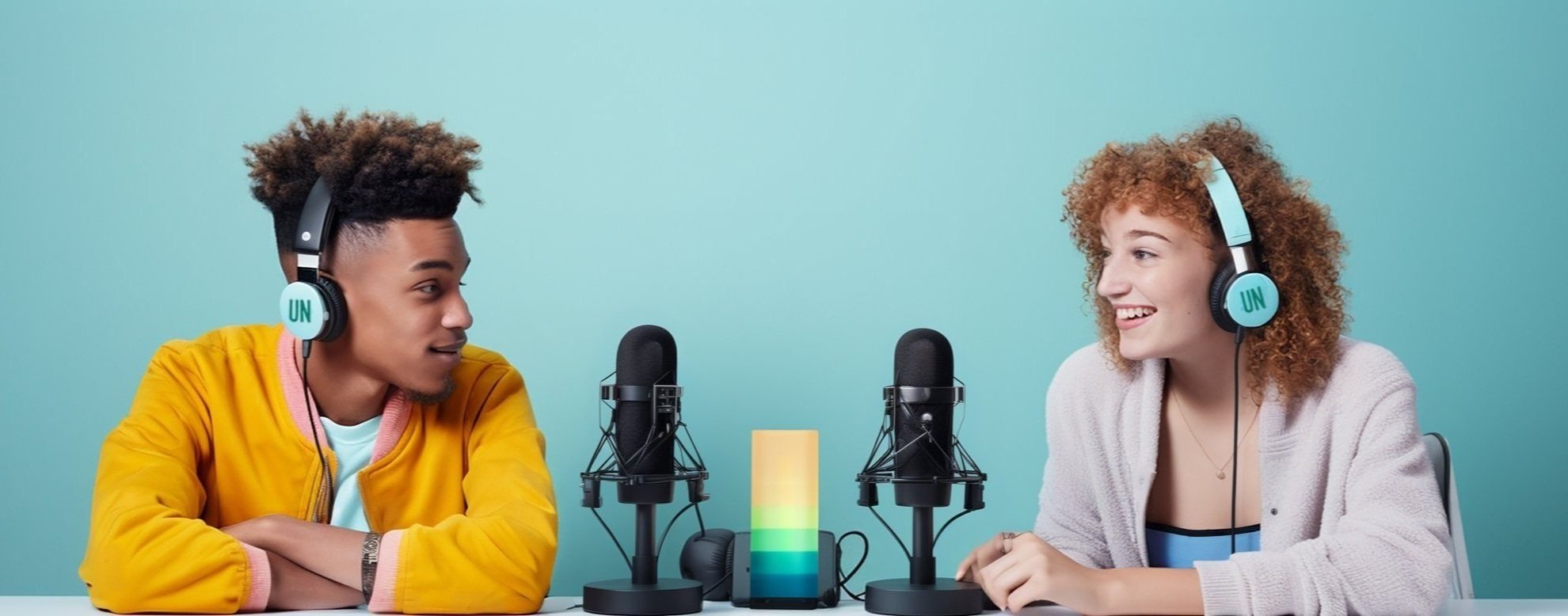
• LIVELY PODCASTS WITH YOUNG PRODUCERS
• INSIGHTFUL HISTORIAN INTERVIEWS
• LIVELY PODCASTS WITH YOUNG PRODUCERS • INSIGHTFUL HISTORIAN INTERVIEWS
Listen To UnTextbooked Episodes
Explore our collection of captivating episodes that tackle pressing issues, unravel untold stories, and bridge generations. Each episode is a journey through time, inviting you to connect with history on a personal level.
What Was The Black Panther Party Fighting For?
In 1968, Martin Luther King Jr. was assassinated, police killed unarmed 17-year-old Bobby Hutton, and Aaron Dixon decided it was time to join the Black Panther Party.
How Does The Legacy of Settler Expansion & Industrialization Destroy Indigenous Livelihood?
Thousands of protestors joined Indigenous activists at Standing Rock to fight for clean drinking water. At its core, this fight echoes the legacy of broken treaties and settler industrialization. Producer Lily Sones talks with Dina Gilio-Whitaker (Colville Confederated Tribes) about how industrialization halted traditional indigenous food ways and how extractive industries cause health effects across today’s indigenous communities.
Why is Spoken Word Poetry Not Seen as ‘Real’ Literature?
Spoken word poetry is an oral tradition dating back centuries. So why is this form of poetry not always taken seriously? Producer Sydne Clarke sits down with Dr. Joshua Bennett, the author of Spoken Word: A Cultural History. His nonfiction debut is a personal investigation into the history of spoken word, specifically the Nuyorican Poets Cafe. This is a cultural hub that started in the Lower East Side living room of Miguel Algarin.
Did the American Civil War ever truly end?
Although the American Civil War ended many years ago, the fight for “a more perfect union” never quite did. A few months after the union army’s victory, confederate-style, white supremacist resistance emerged even stronger than before.
What was the gay bar and how did it shape gay identity?
The gay bar has long since been a locale of sexual expression, community, and most importantly, identity. If the gay bar was what Atherton Lin describes as, “a place where we hoped we could find ourselves,” what does it mean for queer identity when the spaces that once shaped and defined it are steadily vanishing in urban centers worldwide?
Is mass incarceration doing more harm than good?
More American residents are behind bars than any other nation. While the US Criminal Justice System was established to regulate peace and order, it has since become the catalyst for criminalizing people of color. Fueled by initiatives like Nixon’s “War on Drugs” campaign, which unfairly targeted communities of color, mass incarceration has steadily been on the rise. Despite the staggering amount of people behind bars, the crime rates haven’t exactly been on the decline, raising the question: do prisons actually keep us safe?
What is religious racism, and how has it progressed from past to present?
The first amendment to the United States Constitution guarantees that everyone has the right to practice his or her own religion or no religion at all. A similar guarantee exists in Canada under its Charter of Rights and Freedoms. However, this right to religious freedom hasn’t necessarily been assured for practitioners of traditional African religions throughout history in North America.
Are we telling U.S. Indigenous history wrong?
There are more than five hundred federally recognized Indigenous nations in the United States today, nearly three million people, but their stories have largely been omitted from the nation’s history.
Did anyone win the Cold War?
The Cold War was a decades-long military conflict that dominated geopolitics in the latter half of the 20th century. And as Americans, we often see it framed as a binary conflict between the United States and the Soviet Union; one that ended around the time the Berlin Wall came down in 1989.
Did segregation in America ever really end?
The United States is still reckoning with its history of racism. For a century after slavery ended, US businesses, banks, schools, and neighborhoods were segregated by race. It took a series of Supreme Court cases and acts of Congress to legally ban discrimination based on race, but discrimination isn’t just a switch that can be turned from “on” to “off.” The legacy of these unfair laws still affect Black Americans today.
When will Asian Americans stop being seen as "perpetual foreigners"?
There is a fundamental duality in how Asian Americans are perceived in our country. They’ve at times been held up as the “model minority”, affirming this idea that the American Dream is alive and well if only immigrants could work harder. At other times they’ve been regarded as threatening and perpetually foreign. A recent example of this is the dramatic rise in anti-Asian violence in the wake of the covid-19 pandemic.
How did Black Americans forge a cultural identity?
Thousands of protestors joined Indigenous activists at Standing Rock to fight for clean drinking water. At its core, this fight echoes the legacy of broken treaties and settler industrialization. Producer Lily Sones talks with Dina Gilio-Whitaker (Colville Confederated Tribes) about how industrialization halted traditional indigenous food ways and how extractive industries cause health effects across today’s indigenous communities.
Why were Native American kids required to attend boarding schools?
In the spring of 2021, UnTextbooked producer Gavin Scott read a headline that made his heart sink. The remains of 215 indigenous children were discovered buried in a mass grave near the Kamloops Indian Residential School in Kamloops, British Columbia. Over the next few months, more mass graves were found outside of other Canadian residential schools.
Why do so many Westerners fear the veil?
People in the West have many harmful perceptions about Muslim women being submissive or oppressed. In fact, a study conducted by the Pew Research Center found that only 19% of Americans believed that Islam is respectful of women. These beliefs have been reinforced for centuries through media portrayals and stereotypes. One of those persistent stereotypes is that Muslim women are forced against their will to wear hijab, and as a result the veil has come to symbolize women’s oppression. These misconceptions have led to some countries to ban or restrict hijab.
The forgotten mothers of American gynecology.
James Marion Sims has a complicated legacy. He was a surgeon in the 19th century who, for decades, was heralded as the ‘Father of American Gynecology’ for his contributions to the field, including inventing the speculum. But those innovations came at the expense of the poor and enslaved women that he performed experimental surgeries on. Not much is known about the Black enslaved women and poor Irish immigrants he experimented on, but without their contributions, gynecology would not be what it is today.
A historical argument against the gender binary.
As a kid, UnTextbooked producer Gavin Scott loved listening to his grandfather tell stories about their people. He used to like to imagine what his home was like back before white settlers came. As much as Gavin enjoyed learning about his culture, he sometimes felt out of place as the only gay person he knew of in his small hometown. So when he had the opportunity to work on this podcast, he decided to research LGBT Native Americans to learn more about people who were like him.
History fails when it ignores the BIPOC women who made it.
Women of color have been at the forefront of many movements, yet are often neglected, demonized, or ignored.
Meet the Team
Our team of young producers takes the reins, infusing every episode with creativity, curiosity, and fresh perspectives. Join us as we navigate the past and present, sparking meaningful conversations along the way.





















